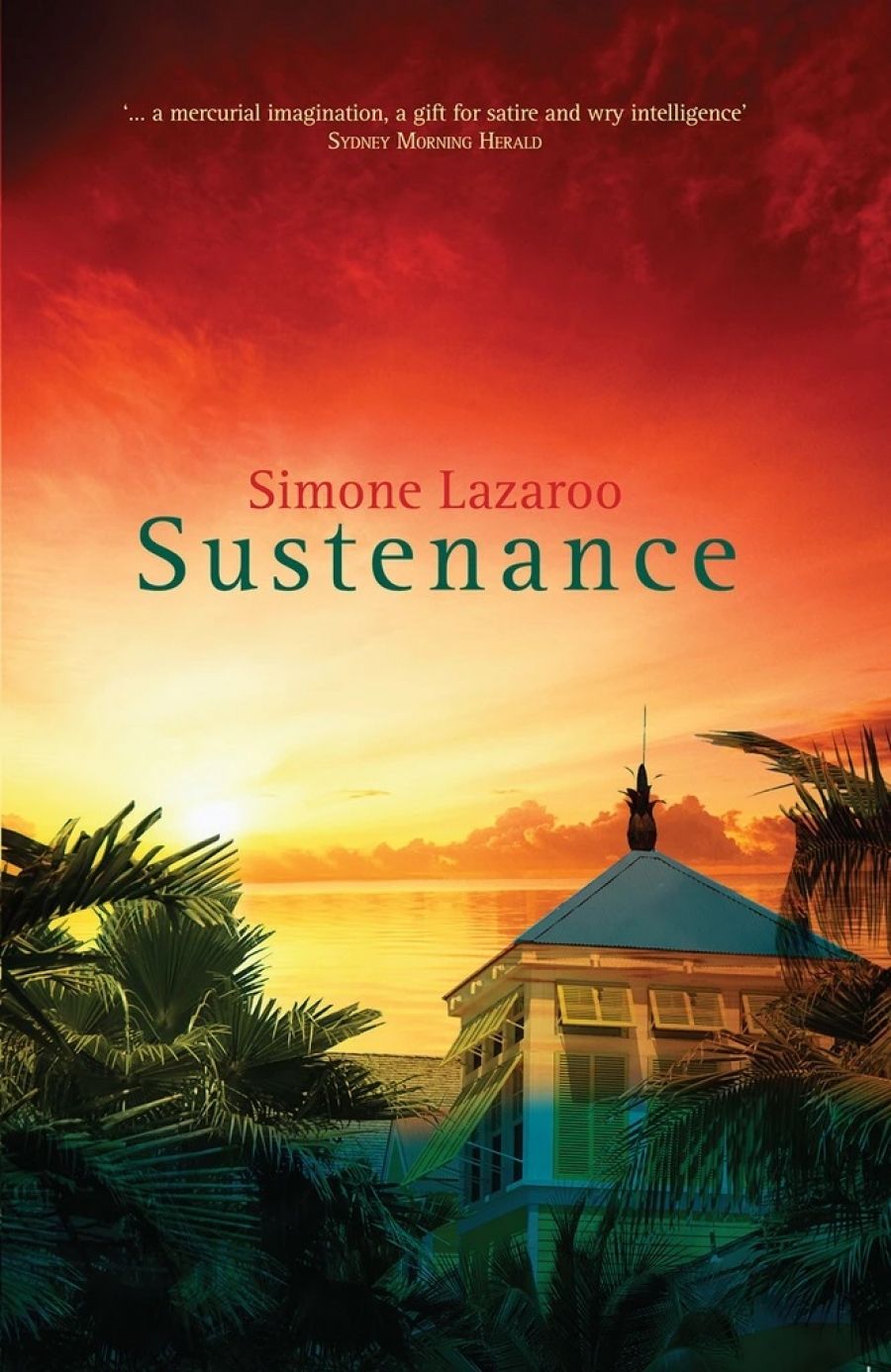
- Free Article: No
- Contents Category: Fiction
- Review Article: Yes
- Online Only: No
- Custom Highlight Text:
Food is often used as a metaphor for a range of emotions, and this device is underscored in Simone Lazaroo’s fourth book. The title alludes to the idea of nourishment as a substitute for love, sex and religion. Indeed, the protagonist, Malaysian Perpetua de Mello, is a chef at a four-and-a-half-star Balinese tourist resort, the Elsewhere Hotel. Although the slogan in its promotional flyer encourages visitors to ‘Find yourself at Elsewhere Hotel’, most of the guests have come to lose themselves, to seek consolation from whatever ails them back home. Though undated, the novel is set soon after the bombing attacks in Bali; the tremors of the terrorist strikes still reverberate. It depicts a nervous island desperate to attract more tourists, if only to stimulate its damaged economy. There has even been a directive in the local media to smile more at foreigners.
- Book 1 Title: Sustenance
- Book 1 Biblio: UWAP, $32.95 pb, 300 pp, 9781742580715
Fortunately for the Elsewhere Hotel, its Western visitors have sublimated any fears for their safety in favour of fluffy white towels and tropical smorgasbords. Lazaroo, however, moves beyond the circumscribed world of artificial luxury. Part of Sustenance’s success lies in its skilful juxtaposition between the sparkling hotel and its attentive, uniformed staff, and the real world outside, with chickens scratching in the dirt and Indonesian villagers eking out subsistence lives. It might have been easy for the author to wax lyrical about poor but honourable natives resentful of, and beholden to, wealthy tourists, but Sustenance does not take this well-trodden path. While it does depict the cultural ignorance, sniffy condescension and sense of entitlement of many Western tourists in Third World countries, Sustenance manages to garner sympathy for them. As Perpetua dryly notes, the hotel seems to function as a sort of ‘luxury hospital’ where its customers seek to alleviate ‘deficiencies of love and hope’.
From young honeymooners (Rosie and Gary Shipman) to retirees (Merle and Jim Hopkins), guests at the Elsewhere Hotel are representative of a certain socio-economic type. There is the wealthy, middle-aged suburbanite Gloria Burns, for instance, who applauds the natives for being so environmentally conscious because they ride on motorbikes and scooters, before being gently informed by the masseuse that many are still saving for their first car. Respite and enlightenment are what Gloria seeks during her stay; her marriage to the obnoxious Des is marred by his infidelities. The French family, the de Forets, try desperately to enjoy their last holiday together before Guy succumbs to a terminal illness. Lazaroo’s characterisation is sharply observant but not stereotypical. She nails the brittle personality of nose-in-the-air Clarissa Philips who regards the hotel as an inviolable sanctuary and who takes offence if the poor, destitute or disabled trespass on her territory. But even Clarissa is seen as an object of pity, her prickliness a shield for her many insecurities.
The guests and the staff may flit in and out of frame, but the main focus of Sustenance is Perpetua. If the kitchen is the hub of the house, the pulsating heart of Lazaroo’s novel is the cook. Like Lazaroo’s previous three novels, which also featured mixed-race protagonists, Sustenance is interested in exploring cross-cultural identities and the impact of post-colonialism in South-East Asian countries. In her late forties, Perpetua has a complex history, with her Eurasian bloodlines (her white, expatriate Alzheimer’s-affected father is part owner of the hotel), her abandoned mother and her lost son. The narrative shifts between her earlier life in Perth with a feckless, philandering husband, and her current station as the Elsewhere Hotel’s resident chef.
Any gourmand will suffer pangs of hunger while reading Sustenance, with its loving descriptions of exotic dishes. Indeed, respect for home cooking and its restorative powers has been handed down on the matrilineal side. For Perpetua’s mother, who toiled at makeshift stalls, cooking good food was a way of ‘refusing hopelessness’, and so it is with Perpetua, who, despite her many disappointments in life, treats her ingredients with as much passion and spiritual verve as a zealot. You know her relationship with an Australian food critic is doomed the moment he suggests that she writes a cookbook sponsored by a company whose new ‘oriental range of spices’ consists mainly of ‘flavour enhancers’ such as MSG.
The first part of the novel carefully describes small arcs in the lives of the guests and the staff at the hotel, with little happening in terms of plot other than the daily routines of the pampered and those paid to be polite. In the second half, the tone and pacing change abruptly; the travelogue morphs into a thriller as some unexpected visitors arrive at the hotel. However, the ensuing drama, which involves a hostage situation, unfolds with an unpredictability that keeps the reader intrigued from the moment the room is plunged in darkness. Throughout, it is Perpetua who offers sustenance. Her carefully prepared morsels are offered to captors and captives alike as tokens of solace and empathy. It is not surprising that at the dénouement of this traumatic episode, everyone experiences small but life-changing epiphanies. Sustenance is like one of those satisfying dishes that have sweet, sour and bitter elements, with an aftertaste that lingers long after the meal is over.


Comments powered by CComment